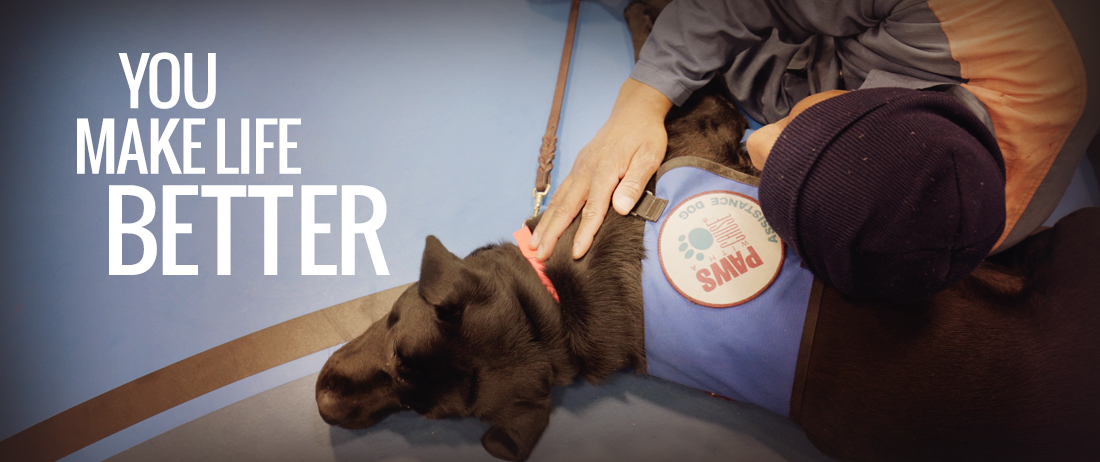PAWS PRISON PARTNERS
With an increasing need for people with disabilities applying for a PAWS Assistance Dog, we have a need to raise and train our Foster Puppies more efficiently. PAWS has helped address this need through the prison partnerships we developed over the years.

BENEFITS TO PAWS
Inmates have time to practice and hone the dogs’ skills and troubleshoot behaviors that may prevent a puppy from becoming an Assistance Dog. This reduces time in formal training so that we can more quickly place our PAWS Dogs with clients.
BENEFITS TO INMATES
Inmates gain a connection to the world while improving self-esteem, confidence, and work ethic, and developing empathy by helping train PAWS Dogs for people with disabilities
BENEFITS TO PRISONS
Morale amongst prison staff and inmates improves and creates a calmer environment. Inmates are more compliant, with fewer infractions since participation in the program is a privilege they earn.
BENEFITS TO COMMUNITY
Research shows inmates who partner with organizations like PAWS are more likely to remain out of prison, compared to those not involved. The program assists in the rehabilitation of the individual and teaches skills to help the inmate become a productive citizen when released.

FREQUENTLY ASKED QUESTIONS
How does this program work?
What dogs are selected to go into this program?
Will this program replace traditional Foster Puppy Raisers?
Does this speed up the training process?
Are the dogs safe?
How are the dogs socialized?
Who pays for this?
What about vet care?
How are inmates chosen to participate?
How does this program work?
PAWS Dogs enter the prison program after spending 12 months with their volunteer Foster Puppy Raisers. Dogs are tested for temperament before placement to provide an evaluation baseline for the dog. PAWS conducts training classes with participating inmates and dogs once a week. This ensures that the inmates’ work and handling skills are consistent with PAWS’ standards.
PAWS Dogs are not permitted within the general prison population and are never left alone. Participating inmates and dogs are housed separately from the general population. Each dog stays with their inmate partners in their cell. Adjacent to the buildings are grassy, outdoor yards that allow for ease of breaking and training the dogs. We also use large, multipurpose rooms for group training exercises.
What dogs are selected to go into this program?
All PAWS puppies at least 14 months or older are sent to our prison programs as a part of their training journey.
Will this program replace traditional Foster Puppy Raisers?
No, we need both! Puppies need more exposure and socialization than they can get in a prison environment. By selecting dogs that have already been trained in homes, they get the socialization and exposure to new environments they need as a future Assistance Dog. Then a PAWS Prison Partner can help with advanced obedience and retrieval work for an average of four to five months before returning to PAWS for selection to determine their end placement.
Are the dogs safe?
Yes! The PAWS Dogs in this program are extremely well cared for by inmates. We have never had a dog harmed. And the work of inmates is closely supervised by prison staff and PAWS Trainers.
Who pays for this?
PAWS is responsible for all costs related to the dogs’ care. All needed supplies, including food, crates, leashes, collars, etc., are provided from PAWS’ inventory We believe this is an effective use of our resources since it results in more successful PAWS placements. Participating inmates receive a small wage for their commitment to training, paid for through prison funds.
What about vet care?
PAWS provides any routine vet care. We have partnerships with vet clinics near each prison the event emergency care is needed. Female dogs who may come into season during their stay will return to PAWS for that 21-day period and then return to their Partner.
How are inmates chosen to participate?
Inmates must apply to be a part of this program and have at least four years remaining on their sentence. We carefully screen each applicant and ensure they do not have a documented history of abuse or criminal sexual conduct. Any inmate infraction in the last 12 months makes them ineligible and any infraction occurring while acting as a PAWS Prison Partner permanently expels them from the program.


How are the dogs socialized?
Because the dogs selected for the program are older, a great deal of socialization and exposure has already happened.